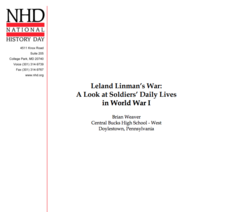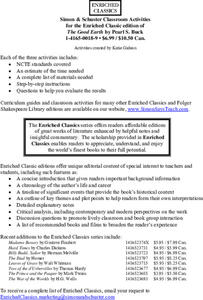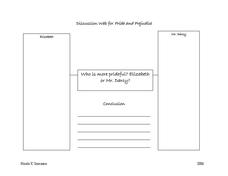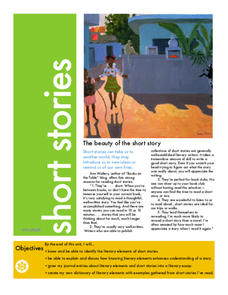Theodore Roosevelt Association
Defining America's Role in the World
As the first American president to win the Nobel Peace Prize, and only one of four presidents to do so in United States history, Theodore Roosevelt's foreign policy achievements and preservation of peace are often overshadowed by his...
National History Day
Leland Linman’s War: A Look at Soldiers’ Daily Lives in World War I
Hunkering down in the trenches of World War I, Leland Linman decided to write a journal about his experiences. By reading Linman's entries in the fourth installment of an eight-part lesson series, scholars get a firsthand look at life in...
National Endowment for the Humanities
Harriet Jacobs and Elizabeth Keckly: The Material and Emotional Realities of Childhood in Slavery
Young historians learn how to make generalizations based on primary sources in a lesson that uses the autobiographies of two women born into slavery. The class watches a historical re-enactment of scenes from the lives of Harriet Jacobs...
PB Works
The Short Stories of Ernest Hemingway
There is more going on under the surface of Ernest Hemingway's work than one can glean in an initial reading. A literature resource compares the themes and structures of several of Hemingway's works before prompting class members to use...
National Endowment for the Humanities
Literary Genres in “Moby-Dick”
Moby Dick is more than a whale of a tale narrated by Ishmael. A activity studying Herman Melville's classic novel asks readers to examine the different genres the author weaves into his story. Instructors model how to conduct a stylistic...
National Endowment for the Humanities
Dostoevsky's Crime and Punishment
Pain and suffering do not have to be inevitable in a study of Crime and Punishment. A carefully scaffolded lesson introduces readers to the divided natures of the characters in Fyodor Dostoevsky's complex novel. Groups use the provided...
Curated OER
The Mill on the Floss by George Eliot
In this literature worksheet, students respond to 13 short answer and essay questions about Eliot's The Mill on the Floss. Students may also link to an online interactive quiz on the novel at the bottom of the page.
Curated OER
Comparing Two Fantasies by J.R.R. Tolkien
Students explore fantasy through The Hobbit by J.R.R. Tolkien. In this literature lesson, students investigate character analysis through book comparisons. Students read The Hobbit and one other book by J.R.R. Tolkien and write a...
Curated OER
Essay on People and Their Experiences
Students explore "Sonny's Blues" by James Baldwin, "The Magic Barrel" by Bernard Malamud, and "Cathedral" by Raymond Carver. In this shorty story analysis lesson, students write down facts about each of the main characters from the...
Curated OER
Emma - Essay Questions
In this literature worksheet, students respond to 25 short answer and essay questions about Jane Austen's Emma. Students may also link to an online interactive quiz on the novel at the bottom of the page.
Curated OER
Transportation Then and Now
Compare and contrast how transportation has changed throughout the years. This image-driven slide show depicts a variety of advances in transportation. Covered wagons, coaches, trolley cars, boats, and bikes are shown as they were in the...
Professional Development Institute
Which Is More Important?
Think about the roles of hunters and squaws in Elizabeth George Speare's The Sign of the Beaver. Whose work is more important? Young writers compare Attean and Matt's reaction to each gender's role, as well as arguing their opinion...
New York State Education Department
US History and Government Examination: June 2011
Those who lived during the Great Depression could clearly draw a line between the roaring 1920s and the desolation of the following decade. Class members examine these two periods and compare them using an essay question prompt and...
Simon & Schuster
Classroom Activities for The Good Earth by Pearl S. Buck
An 11-page packet includes three activities to engage pupils in reading Pearl S. Buck's The Good Earth. To understand the historical context, class members research a list of topics related to Chinese history and culture. They then...
Teach Engineering
Earthquakes Living Lab: The Theory of Plate Tectonics
Find out if your class agrees with Ice Age: Continental Drift ... or if it's just a fun family movie! Class members research the theory of continental drift, examine evidence of plate tectonics, connect this information to engineering,...
Curated OER
Pride and Prejudice: Discussion Web
Both Elizabeth and Mr. Darcy have proud moments, but who is more prideful? Explore Jane Austen's Pride and Prejudice with a discussion web that compares both characters in a brainstorming graphic organizer. Each side provides enough...
PBS
Catch-22: What It Means to Be a(n Anti)Hero
Catch-22, Joseph Heller's send-up of military organizational bureaucracy, provides readers with an opportunity to consider the importance of the anti-hero. Class members fill out a worksheet comparing and contrasting the qualities of...
Federal Reserve Bank
Expense Tracking
Where does all your money go? Individuals keep a record of the money they spend over the course of 30 days. They then categorize where they are spending their money and write an essay detailing their findings.
PBS
Mark Twain: Storyteller, Novelist, and Humorist
Scholars investigate the use of satire in Mark Twain's writing. Literary lovers research the Adventures of Huckleberry Finn and Tom Sawyer, political cartoons, and videos to see how Twain uses satire to make the stories more memorable....
National Constitution Center
Civil Liberties and Rights Worldwide
How do governments differ in how they protect human rights? While the United States prides itself on its Bill of Rights, other countries have their own ways of protecting citizens' liberties. An interactive website, paired with...
Nettlehorst School
The Beauty of the Short Story
Put scholars in charge of their learning! Individuals read information, discuss what they learned, and put their new knowledge into practice—all in a complete and detailed resource. Activities include creating a literary terms handbook...
Curated OER
Election of 1864
An interesting lesson plan uses a hands-on-activity and group discussion to explore the 1864 presidential election and Lincoln's plans for ending the Civil War. Designed for high school, the resource also requires historians to...
Curated OER
1864-1865: Bringing the War to an End
An interesting lesson plan explains the last battles of the war and the terms of the Articles of Surrender. It also analyzes the election of 1864 with copies of the Baltimore and Chicago platforms. To conclude the lesson, academics...
EngageNY
Analyzing the Features of a Newspaper Article
There's more to newspaper articles than meets the eye. Scholars learn the different features of a newspaper article, including headline, byline, subheadings, etc. Pupils circle the features in an article as the teacher discusses their...
Other popular searches
- Comparative Essay Writing
- Comparative Essay Template
- Writing a Comparative Essay
- Comparative Essay Samples
- Comparative Essay Plans
- Wrting Comparative Essay
- Comparative Essay Myths
- Writing Comparative Essays

























